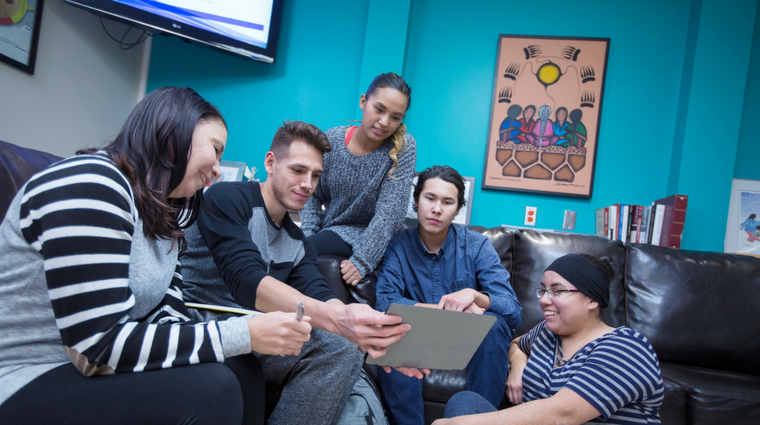
Sask Polytech’s second Massive Open Online Course (MOOC) focuses on Indigenous culture and history, particularly as it relates to Saskatchewan and examines the theme of reconciliation in Canada
June 3, 2019 – Situated on Treaty 4 and Treaty 6 territories, and Homeland of the Métis, Saskatchewan Polytechnic is committed to the renewal of relationships — miyo wahkohtowin — with our Indigenous communities. Sask Polytech has created a free MOOC to provide an introduction to the diverse Indigenous cultural groups within Saskatchewan. Students will learn about the colonization of Indigenous peoples, reconciliation, Indigenous histories, perspectives, worldviews and approaches to learning.
“Indigenous students are an important part of the Sask Polytech community. We developed the Introduction to Indigenous Studies MOOC with our students in mind,” says Dr. Larry Rosia, president and CEO. “Our instructors requested information to develop their knowledge and understanding of Indigenous people’s worldviews and cultures to create inclusive learning spaces. This is one of the ways we are helping our instructors learn more about Saskatchewan’s Indigenous history.”
“From an Indigenous perspective, this course explores key issues facing Indigenous peoples today from a historical and critical perspective,” says Jason Seright, director of Indigenous Strategy. “MOOC participants will have a better understanding of Indigenous peoples and their unique place in Saskatchewan and Canada’s history, which has led to today’s challenges and opportunities.”
Learning objectives include:
- Deepening understanding of Indigenous nations of Saskatchewan.
- Exploring how colonization has impacted Indigenous peoples.
- Engaging in discussions on current issues and solutions in an empathic and respectful manner.
The Indigenous studies MOOC is open to anyone over the age of 13 who has access to a computer or mobile device and the Internet. MOOCs have attracted public attention since 2012, when post-secondary institutions such as Harvard University and the Massachusetts Institute of Technology started developing and delivering these highly accessible courses.
The Introduction to Indigenous Studies MOOC is expected to take 15 hours to complete. The course is designed so students can work at their own pace through on-line learning. Learning activities include a reflection paper and group assignment.
“In order to establish miyo wahkohtowin (good relations), we have to learn about Indigenous peoples, to enter into the history of colonization through the lens of those who experienced injustices,” says Has Malik, dean of Arts and Science, Business, and Information and Communication Technology. “Sask Polytech’s MOOC allows students, faculty, staff and the general public to explore the history of the Indigenous nations of Saskatchewan and learn about the issues currently facing Indigenous peoples.”
The current MOOC runs from April 26 – June 27, 2019. Registration can take place at any time before June 20 during the instruction period. If participants are unable to finish the course by the closing date, they can re-register and continue their studies from the same point in the following session.
The Introduction to Indigenous Studies MOOC is delivered on the Desire2Learn Open Courses platform. Students can register for the course free of charge at www.opencoursesstore.d2l.com.
Saskatchewan Polytechnic serves students through applied learning opportunities at campuses in Moose Jaw, Prince Albert, Regina and Saskatoon, and through extensive distance education opportunities. Programs serve every economic and public service sector. As a polytechnic, the organization provides the depth of learning appropriate to employer and student need, including certificate, diploma and degree programs, and apprenticeship training. Saskatchewan Polytechnic engages in applied research, drawing on faculty expertise to support innovation by employers, and providing students the opportunity to develop critical thinking skills.

